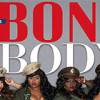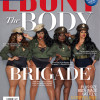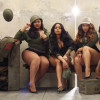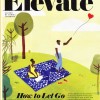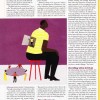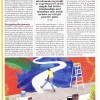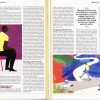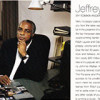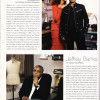EBONY is monthly magazine reaching nearly 11-million readers. EBONY ignites conversation, promotes empowerment and celebrates aspiration and available nationwide. A community for hot topics and trends, advice, critical conversation, and the best in entertainment and breaking news on Black life in America. Through original reporting and pointed analysis, EBONY reflects the diversity and broad spectrum of daily thought and opinion within the African-American community with a fresh and intelligent point of view, and provokes and inspires dialogue connecting all points of the African-American world.
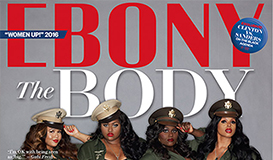
The Curvy Confessionals
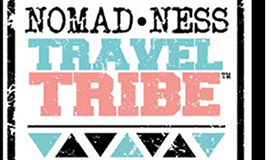
A Tribe Called Quest
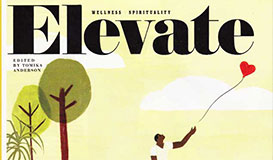
Elevate
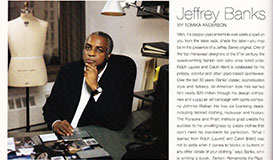
Jeffrey Banks
-

The Curvy Confessionals
In an excerpt from our March 2016 cover story,Tomika Anderson leads a conversation about body image, Black women and self-acceptance
What would be evoked in you, readers, if I said said the women photographed here—Grammy winner Chrisette Michele, 33; R&B chart topper Jazmine Sullivan, 28; Orange Is the New Black actress Danielle Brooks, 26; and plus-size blogger and swimwear designer Gabi Fresh, 26)—and I were sitting around a steakhouse table selecting from family-style options including filet mignon, roasted chicken, mac ‘n’ cheese, mashed potatoes, creamy spinach, salad and, eff it, cheesecake? Would you frown in disgust? Shake your head? Cheer us on? Think nothing of it?
Those of us who identify as chunky, curvy, plus-size, big, ample, full-figured, BBW, big-boned, thick, voluptuous, heavy-set or fat are fully aware of the obsession-rejection, push-pull, love-hate relationship society has with our physiques. What others may think about what we do or don’t eat doesn’t matter; the greater judgments, regardless of whether they are favorable, come from within. your head? Cheer us on? Think nothing of it?
Although African-American women have the dubious honor of weighing in as the most obese of any group in the country (recent national data finds that 80 percent of Black women are considered overweight or obese), it’s worth noting that nearly 70 percent of Black men are overweight or obese as well, compared with 71 percent of White men and 63 percent of White women.
To be a “brick house” or “thick” has never been a sin in Black America, and not surprisingly, overweight Black women are also reported to be happier with their bodies than White women across the weight scale. The perceived White women’s coveted “skinny” status is not a universal goal for their Black counterparts; some of us who wear size 12, 14, 16, 18, 20 and up actually like ourselves as we are.
But there is also the issue of health. With nearly 80 million obese adults—and in 2008, more than $145 billion spent on related medical costs—the relationship between weight and deadly health conditions (e.g., type 2 diabetes, stroke and heart disease) likely loomed large in National Consciousness Raiser-in-Chief Oprah Winfrey’s decision to purchase 10 percent of diet company Weight Watchers last fall.
It’s the career-long personal war with weight the media powerhouse has waged against herself that best underscores why the topic of Black women and body image remains salient. In a 60-second Weight Watchers TV commercial released in 2015, Winfrey reflected on her fluctuating size over the past 25 years against a video backdrop of her at her heaviest and later sweating it out on a hike, declaring, “Inside every overweight woman is a woman she knows she can be.”
The commercial set off many critics, including MSNBC’s Melissa Harris-Perry, who called the 62-year-old’s failure to completely accept herself because of her weight in the face of all she’s achieved, “distressing.” Indeed, Winfrey’s declaration stands in contrast to the “body-positive” movement that has entered the cultural zeitgeist. From Dove’s diverse bodied ads and Lane Bryant’s “#ImNoAngel” lingerie campaign (a voluptuous counter to Victoria Secret’s ever-thin “VS Angels”) to fashion magazines featuring more plus-size models, the megasuccess of larger women such as Adele and Amy Schumer and the slew of social media players play up the idea that bigger is better.
The questions persist: Does Winfrey set a good example by wanting to be thinner or a bad one for implying there is something wrong with the way she looks now? Does having issues with your weight mean you don’t love yourself?
The five of us are dining on just what I mentioned above; I left out only the wine. We are all Black women who have had varying struggles with weight, food and body acceptance. Unlike me, my dining mates lead public lives. In this exclusive conversation, you will be privy to their raw emotional honesty and sound intellect, and whether you are someone who could have joined us for the meal or someone who has never engaged in the body image battle, you will learn how critical, complicated, contradictory and sometimes completely satisfying the relationship between big Black women and their bodies is. -

A Tribe Called Quest
What happens when 18 strangers meet on Facebook and travel to the jungles of Central America? Paradise found.
All right, I’ll admit it: The No. 1 reason I agreed to brave the sweltering heat, itchy brush and blankets of mosquitos in the jungles of Panama in January was to meet a man.
*Kwame was just my type: 6-feet 4-inches, chocolate-skinned, athletic, witty, funny and a fellow world traveler. Though he lived in Paris and I in Brooklyn, we’d “met” last fall on Nomadness Travel Tribe, a high-energy, invitation-only, virtual hotspot on Facebook for Black and Brown globetrotters. On this page, members can scan one of the group’s 20-plus meticulously maintained “country docs” (guides to various countries where members have traveled) and find out which market a sista can visit in Lagos to get a dress made or which ’hood a brotha can drop by in Seoul to get a line up.
When Evita Turquoise Robinson founded the Nomadness Travel Tribe Facebook group—it’s also a Web series—last September, she casually dubbed us an “international travel mafia”: people of color who prefer wandering the ruins of Machu Picchu in South America or backpacking through the Sahara Desert to the typical beach vacay. As an Army brat who lived in Germany as a child and has since visited more than 30 countries, I was eager to meet people who looked like me and shared my wanderlust.
Our first opportunity to meet face-to-face came when Nomadness announced its first international group excursion. We were to travel to Bocas del Toro, an archipelago in the Caribbean province of Panama that was also home to a member of the tribe. The first 18 people to book their tickets would spend a week at a ranch resort—no television, phones, reliable Internet or easily accessible transportation.
You know Kwame didn’t make the trip, right? After yapping for weeks about pioneering the maiden voyage, he pulled out at the last minute. Something about being too busy at work. (Hmpf!) I was disappointed, but travelers are, by nature, an independent and resilient bunch, so I tapped my girl Shameeka to join me instead.
It took three flights and a cab ride to get to the Bluff Beach Retreat, a 16-room, off-the-grid, 100-percent solar-run ranch consisting of a main beach house, two casitas (cottages), a private beach and a dirt road with no name. Our cab pulled into the driveway just as three of our housemates rode up on bicycles, mud-caked from pedaling along the beach in the rain. Shameeka and I were so happy, we hugged them despite their mudiness, and all together we dragged our luggage down the cobblestoned path toward the house.
